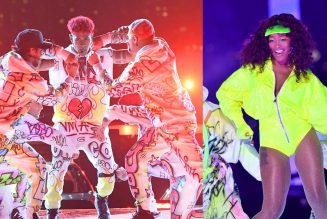
Three of the five acts contending for the 2021 Best Children’s Album Grammy Award have declined their nominations. As NPR reports, The Okee Dokee Brothers, Dog on Fleas, and Alastair Moock are protesting because the Recording Academy failed to consider any non-white artists.
The three groups sent a joint letter to the Recording Academy asking that their names be removed from consideration. They wrote that they “couldn’t in good conscience benefit from a process that has historically overlooked women and artists of color.”
“After this year, to have an all-white slate of nominees seemed really tone deaf,” said Moock. He was nominated for Be a Pain, an album about American heroes including Martin Luther King, Jr, Rosa Parks, Harvey Milk, and the Parkland shooting survivors. Moock added that he’d still like to win a Grammy, “but I don’t want it like this, where the playing field’s not even.”
Justin Lansing, one of The Okee Dokee Brothers, said it was especially important to take a stand because children’s music artists are “tasked with modeling fairness and kindness to kids and families.” His partner Joe Mailander, added that, “We thought that it was the strongest thing we could do, to stand with people of color whose albums are too often left out of the Grammy nominations.” He continued, “This is not just white guys with guitars playing for kids. We want to welcome all different types of music to this community.”
When asked by NPR who should have been nominated, the groups pointed to Pierce Freelon, whose album D.A.D. traversed jazz, hip-hop, electronic, and Caribbean music. Pierce applauded the decision by the three nominees, saying, “I just couldn’t think of another example in my memory of white men specifically revoking their privilege in this way.” He in turn mentioned a lifetime of snubs directed at 96-year-old folk singer Ella Jenkins. “She’s probably the most prolific and foundational person in children’s music,” he said. “And she’s a Black woman. But guess what? She’s never won a Grammy Award through the Recording Academy process. They had to give her an honorary lifetime achievement award, but she actually never got that recognition from her peers in the industry.”
One of the two artists who chose to remain on the ballot is Joanie Leeds, nominated for her feminist album For All The Ladies. According to Leeds, “I didn’t decline because my album is really about empowering young women. I mean, I have 20 women on my album. So for us, it was like it was kind of counter to to our empowering women message to step down.” She added, “I know that this is really about the guys that dropped out, but I feel like a lot of times women are kind of left on the side. It’s a shame. I wish there was more equality with women.”
The Okee Dokee Brothers, Dog on Fleas, and Alastair Moock have supported Leeds’ decision. The fifth nominee, Justin Roberts, has so far declined to comment.
Editors’ Picks
Last month, the nominees spoke with the Harvey Mason Jr., the Recording Academy’s new CEO, as well as its first ever Chief Diversity, Equity and Inclusion officer, Valeisha Butterfield Jones. Butterfield Jones didn’t comment directly on the Best Children’s Album controversy, but did say that, “We’re an organization that’s ready for change but you know, we’re not unique to the challenges of the world and to the challenges of our industry. I think it’s time. You know, we saw in 2020 a racial reckoning. So now, you know, it’s, you know, up to us what we’re going to do to take real and meaningful action.”
2020 was a year of small changes for the Recording Academy. Over the summer, the Grammys renamed renamed the “Urban” categories after years of criticism, and in November they changed the Best World Music category to Best Global Music because of “connotations of colonialism” with the former.










